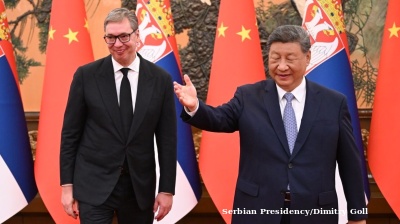The Kosovo Business Alliance has warned that the ongoing institutional paralysis in the country is inflicting unprecedented damage on economic development, blocking access to vital international funding and undermining investor confidence, the alliance said in a Facebook post.
Although Kosovo held general elections on February 9, its new institutions have yet to be formed.The political standoff follows months of failed votes for the assembly’s leadership, leaving Kosovo without a functioning parliament.
The inaugural session of parliament, which began on April 15, has stalled due to a deadlock over electing the assembly speaker. The largest party in the new parliament, Vetevendosje, together with its coalition partners Guxo and Alternativa, nominated MP Albulena Haxhiu for the post, but she fell short of the required 61 votes.
In a statement, the alliance stated that the absence of functional institutions and the failure to ratify international agreements are causing significant financial losses and slowing Kosovo’s transformation into a competitive, sustainable economy.
It slammed the actions of acting Prime Minister Albin Kurti’s Vetevendosje, with the statement describing an “institutional blockade and violation of the constitution by the largest party in the country, which for six months in a row has proposed the same candidate for chairman [of the parliament], contrary to the fundamental law of to the state.”
The statement added: “This deliberate political crisis has paralysed state decision-making, hindered institutional functioning, and caused massive losses in every sector – from manufacturing and export, to foreign investment and strategic projects.”
The last six months of political and legal uncertainty have resulted in around €300mn of direct losses, with a a drop of up to 25% in production capacities, suspension of international contracts and departure of foreign investors.
“These aren't just statistics - there are thousands of lost jobs and dozens of businesses on the verge of bankruptcy,” the statement said.
Figures published by Gazeta Express show that according to the organisation’s data, between early 2024 and mid-2025, Kosovo lost an estimated €600mn in potential international funds across key sectors, including environment, energy and culture.
The deadlock has also jeopardised access to over €60mn in EU pre-financing under the €880mn EU Growth Plan, as well as €90mn from the World Bank, both of which remain frozen due to the non-functioning of parliament, reported Gazeta Express.
The alliance estimates daily losses of more than €1.2mn, citing weakened business confidence, reduced foreign investment, and stalled budget projects. The group warned that the situation risks isolating Kosovo from regional development opportunities, as other Western Balkan states advance with EU-backed financing.
“The economy cannot be held hostage to political bargaining - every day the lockdown is a fatal blow to the country,” commented Agim Shahini, chairman of the AKB, according to the alliance’s Facebook page.
The business association urged all political forces to take immediate, responsible action to resolve the stalemate. “Every day without functional institutions is one more day towards economic regression, international isolation, and the loss of historic opportunities for development,” the statement said.
News
.jpg)
EU presses ahead with December signing of divisive Mercosur deal
The European Commission is gearing up to sign its contentious trade agreement with South American bloc Mercosur on December 5 in Brazil, possibly sealing the fate of an accord that has languished in negotiations for more than a quarter-century.
_(1)_1759320127.jpg)
Mexican tycoon Carlos Slim invests $2bn in Veracruz oil field as Pemex drowns in debt
Mexican businessman Carlos Slim has expanded his involvement in the country’s hydrocarbons sector through a new drilling agreement with the state-owned oil company Petróleos Mexicanos (Pemex).

Afghanistan grinds to a halt as Taliban cuts off internet
fghanistan telecom firms confirm nationwide internet shutdown ordered by leadership as UN warns blackout threatens earthquake relief efforts and pushes 43mn people offline indefinitely.

Milei to meet Trump at White House as Argentina seeks $20bn swap before election
Argentine President Javier Milei will meet US President Donald Trump at the White House on October 14, less than two weeks before congressional elections that could determine the fate of the libertarian leader's economic reforms.




